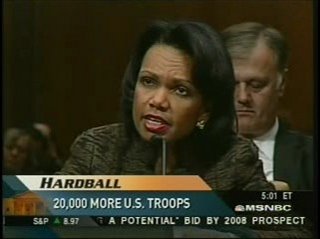U.S. Invades Iran; U.S. Senate Unloads on Condi

The U.S. is at war with Iran. We invaded them two days ago.
Specifically, U.S. and multinational forces stormed a diplomatic office flying an Iranian flag in the northern Iraqi city of Irbil, and arrested five Iranian officials from the office. The office, depending on its precise status as an embassy, consulate or diplomatic mission, is arguably Iranian soil, and thus the invasion of the office and capture of the officials inside is arguably an invasion of Iran and an act of war. The U.S. attack on Iran occurred hours before George Bush's nationally televised speech on Iraq, in which he stated that:
Iran is providing material support for attacks on American troops. We will disrupt the attacks on our forces. We will interrupt the flow of support from Iran and Syria. And we will seek out and destroy the networks providing advanced weaponry and training to our enemies in Iraq.
The U.S. has also taken two other steps in its war with Iran. First, the Treasury Department designated Bank Sepah, an Iranian state-owned bank, as involved in the proliferation of weapons of mass destruction. This action gives the U.S. government the power to freeze Bank Sepah's assets in the United States. Second, the U.S. has sent a naval fleet to the Persian Gulf off the coast of Iran. These are familiar steps that the U.S. has taken against other countries in the past, including Iraq, at the beginning of a war. Sending the navy off the Iranian coast is also, along with the storming of the Iranian diplomatic office, a sneaky way to provoke an Iranian attack on us and then responding in turn, claiming self-defense, and hastening the all-out shooting war with Iran.
Meanwhile, yesterday the U.S. Senate Foreign Relations Committee unloaded on Secretary of State Condoleeza Rice over George Bush's plan to escalate the number of U.S. troops in Iraq. It wasn't surprising that the Democrats, who now lead the committee, opposed Condi and Bush so fiercely, although the level of their opposition was something new. What was really surprising was the opposition coming from Republicans on the committee. Republican Senator Chuck Hagel of Nebraska had the sound bite of the day:
I think this speech, given last night by this President, represents the most dangerous foreign policy blunder in this country since Vietnam, if it's carried out.
Ohio Republican Senator George Voinovich expressed a similar sentiment:
I've gone along with the president on this and I've bought into his dream and at this stage of the game I just don't think its going to happen.
Condi sat hunched over against this barrage, looking like the Grinch at a Christmas party. It was a stunning day in the U.S. Congress, and a turning point in Bush's Iraq War. As committee member Barbara Boxer of California stated, this marks the end of George Bush's rubber-stamp Congress.
It is unfortunate that the U.S. war against Iran had to come four years after the war on Iraq. After the U.S. war on Al Quaeda and the Taliban in Afghanistan (a war that the U.S. abandoned prematurely in order to invade Iraq), Iran is perhaps the next war that the U.S. should have waged. As I pointed out nine months ago , Iran finances and supports terrorism. Iran has a WMD program, including one to develop nuclear weapons. But the problem is that, with Bush having gone to war against Iraq instead of Iran and having waged that war in the most dishonest and incompetent way, the U.S. now has no spare troops, no extra money, no national will, no credibility and no international support at the very time that we may need it the most.




1 Comments:
This is pretty scary stuff. How are we ever going to emerge from the deep dark hole we are in?
Post a Comment
<< Home